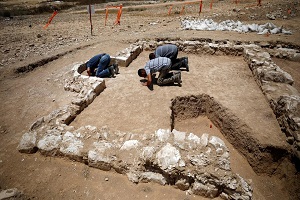
By Neelam Rahim
Israeli archaeologists on Wednesday unveiled a rare ancient masjid within the country’s south that the antiquities officials shed lightweight on the region’s transition from Christianity to Islam.
The remains of the masjid, believed to be entirely one, 200 years recent, were discovered throughout works to make a replacement neighbourhood within the Palestinian Bedouin town of Rahat, the Israel Antiquities Authority (IAA) said in a statement.
The masjid set within the desert (also known as Naqab in Arabic) contains “a square area and a wall facing the direction of Makkah”, with a half-circle niche in this wall pointing to the south, the IAA said.
“These distinctive fields of study options show that the building was used as a mosque,” the authority said, noting it in all probability hosted many dozen worshippers at a time.
A short distance from the masjid, the IAA said that a “luxurious estate building” was conjointly discovered, with remains of ware and glass artefacts informed to the wealth of its residents.
Three years passed, and the authority unearthed another masjid close from a constant era of the seventh to the eighth century, the two Muslim places of worship “among the earliest familiar worldwide”.
The mosques, estates, and different homes illuminated “the historical method that passed within the northern Negev Desert with the introduction of a replacement faith –- the faith of Islam, and a replacement place and culture within the region,” the IAA said.
“These were step by step established, inheritable the earlier Byzantine government and Christianity that command sway over the land for many years.”
The Muslim conquest of the region occurred within the half of the seventh century.
The IAA said the mosques found in Rahat would be preserved in their current locations, whether or not as historical monuments or as active places of prayer.







0 Comments